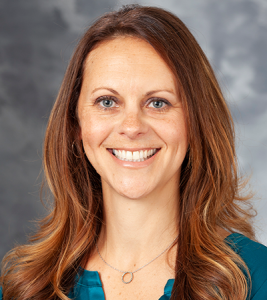
12 Dec Team Spotlight: Tina Graber
 Tina Graber is an Operations Manager within the Clinical Research Office, responsible for overseeing the regulatory service line.
Tina Graber is an Operations Manager within the Clinical Research Office, responsible for overseeing the regulatory service line.
PLEASE SHARE A BIT ABOUT YOUR PROFESSIONAL JOURNEY. HOW DID YOU ARRIVE AT YOUR CURRENT POSITION?
My arrival at UW may be a bit unorthodox. After working in retail for many years and realizing my interest in fashion was unlikely to pan out in the form of a suitable career, I started thinking about what else I might be interested in doing. I was unsure at the time and a family member (who worked at the UW) suggested I take the WI State exam. I took the exam, passed, and started receiving letters for vacant positions. I responded to a letter from the Office of Clinical Trials, interviewed, and acquired a position as a Program Assistant. I’ve been here ever since, growing with the department in various roles, with most of my time spent in the regulatory field.
WHAT MOTIVATIONS FUELED YOUR CAREER PATH?
At the beginning, I was simply looking for a job, something stable with benefits until I figured out what I really wanted to do in my life in terms of a career. As I began to learn about clinical research, the more interested and eager I was to continue to learn and grow in the field. I found it to be a challenging field and one in which I was always learning something new. In clinical research there are various paths one can go down in terms of a career. I started out working in the administrative side of things, dabbled a bit in budgeting, but ultimately landed in the regulatory field. I realized early on with all the federal, state, and local rules, regulations, policies, and guidance to learn, interpret, and apply, that I would never get bored and there was so much knowledge to be gained – all of which is a motivation for me. Each day is different. Being part of the team that assists researchers conducting studies is also a motivator. Our researchers are extremely busy and if I can help ease the regulatory burden a little bit, that’s what I’m here to do. I also love the colleagues and teams I’ve had the pleasure of working with throughout the years. Last but not least, being a part of the larger picture and the hope of bringing new treatments to people in need is always at the forefront and motivates me to continue doing what I’m doing.
WHAT ARE SOME PROFESSIONAL DEVELOPMENT TOOLS OR RESOURCES THAT YOU WOULD RECOMMEND TO OTHERS IN YOUR POSITION/FIELD?
There is so much information and resources available (many that are free), such as the UW Clinical Research Office web page, UW-Madison Policy Library, UW IRB web page, FDA, and HIPAA (just to name a few). UW also offers many presentations, workshops, and seminars for free. I would recommend taking advantage of those resources that are related to regulatory as well as topics that are outside of the regulatory field. Having a broader understanding of all the elements of clinical research can shed light on the complexity of it and how the pieces all work together. I would also recommend learning from others in the field and building those relationships. Another great professional tool and resource is a professional certification such as the ACRP Certified Professional Certification or the SoCRA Clinical Research Professional Certification. These certifications are sets of standards, knowledge, education, and experience by which Clinical Research Professionals are recognized.
HOW IS SUCCESS DEFINED IN YOUR FIELD?
I would say success in the regulatory field is when you are able to offer regulatory expertise and guidance to research teams and when you obtain IRB approval (and other regulatory committee approvals as applicable) for a research study. Those are a win and allow the research to move forward and be conducted in human participants. The regulatory field is a bit of a niche area and putting your knowledge, expertise, and skills to use by taking complex protocols and writing them into plain language in applications, consent documents, and other study material all while interpreting regulations and policies is a unique ability.
WHAT DO YOU LIKE MOST ABOUT YOUR ROLE?
What I like most is helping people and patients and at the end of the day, they are ultimately what matters.
WHAT ARE SOME CHALLENGES YOU FACE IN YOUR ROLE?
I would say one of the greatest challenges is also one of the things I like most, which is that things are always changing. Over the years working at UW and in this field, rules, regulations, policies, guidance, infrastructure, and systems have all changed in some way or another (and sometimes multiple times) but that is also part of the interest and variety that I love. I work with many external committees and institutions, which adds another layer of complexity to the work I do. Nothing stays the same, things will continue to progress, and being flexible in this environment is imperative.
HAVE ANY MENTORS IMPACTED YOUR PROFESSIONAL DEVELOPMENT? HOW DID YOU DEVELOP THESE RELATIONSHIPS?
Yes, for sure! My mentors, of which the majority have been my supervisors and colleagues (past and current), are among my biggest supporters and advocates. I wouldn’t be where I am without them. They have impacted my professional development greatly by being supportive, kind, positive, patient, and respectful, and at the same time providing education, resources, insight, flexibility, and opportunities to continue to learn and grow in this field. Not only have these individuals been my supervisors and colleagues, but I also call them friends and it’s important to develop and nurture true personal working relationships. I hope I’ve done the same for them in return.
WHAT DO YOU WISH YOU HAD KNOWN WHEN YUOU STARTED YOUR CAREER PATH?
I wish I had known more about the overall process and all of what is required in getting clinical research up and running at the UW as well as the various types of positions/jobs available related to clinical research. It’s difficult to know what path to take and where a path may lead you when you are new to clinical research and don’t know what you don’t know. I came from an outside world completely different than clinical research and it was an intimidating step to take but one I’m glad I did. I had no idea that stepping in the door of OCT would lead me to where I am today, but I am grateful the team saw my potential and I was given the opportunity.
WHAT ADVICE DO YOU HAVE FOR SOMEONE PURSUING A SIMILAR CAREER PATH TODAY?
Don’t assume anything, ask questions, build relationships, and don’t be afraid to seek opportunities including continued education opportunities. Stay true to who you are and learn all that you can. Listen, observe, and be a team player. No single person in clinical research has all the answers and no one can do it alone. Be humble, kind, and respectful
WHAT’S YOUR FAVORITE PART ABOUT WORKING WITHIN UW’S CLINICAL RESEARCH COMMUNITY?
The people! I’m always in awe of the wonderful, intelligent, creative, hardworking people we have in our community.



